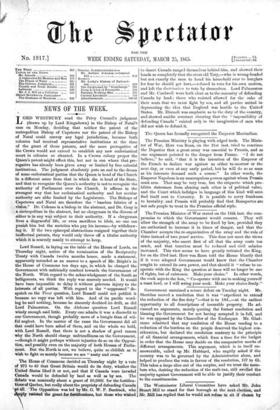Government sustained a severe defeat on Tuesday night. Mr. Sheridan
moved a resolution that it was "expedient to extend the reduction of the fire duty"—that is to 18d.,—at the earliest opportunity to all descriptions of insurable property. He ad- vanced no arguments, merely quoting the former resolution and blaming the Government for not having accepted it in full, and he was opposed by the Chancellor of the Exchequer. Mr. Glad- stone admitted that any resolution of the House tending to a reduction of the burdens on the people deserved the highest con- sideration, but declared the resolution contrary to the principle of all financial arrangements, which fixes a time for the budget in order that the House may decide on the comparative merits of different arrangements. This argument, which is in itself un- answerable, called up Mr. Hubbard, who angrily asked if the country was to be governed by the Administration alone, and helped to produce the vote in favour of the resolution, 137 to 65.. This takes a large slice out of the surplus, and we trust the mem- bers who, desiring the reduction of the malt-tax, still swelled the majority against Government will be able to justify their conduct to the constituencies.






























